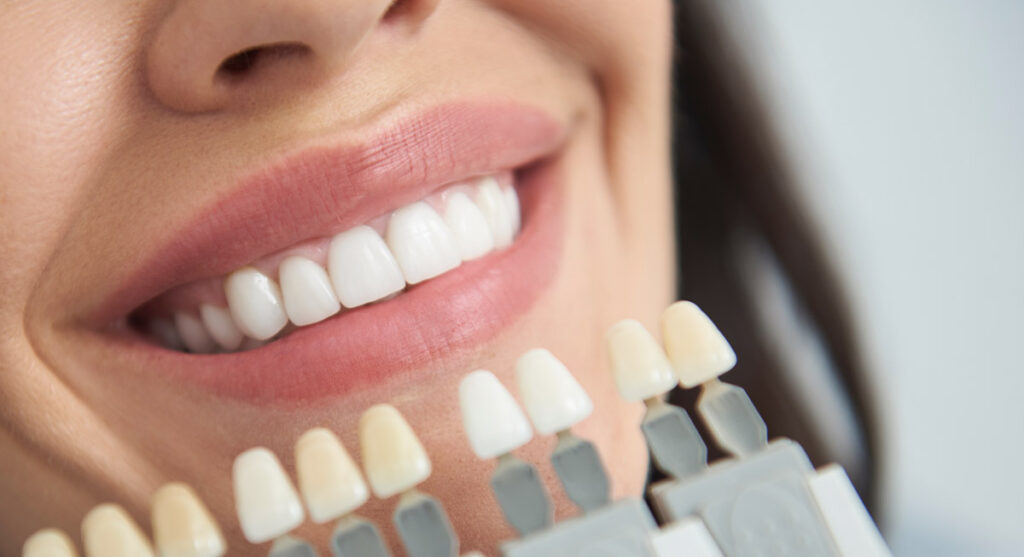A bright, healthy smile can boost confidence and improve overall well-being. However, many people struggle with dental imperfections such as discoloured teeth, crooked or misaligned teeth, chipped teeth, and missing teeth. Fortunately, cosmetic dentistry procedures offer solutions to enhance the appearance of your teeth while also contributing to better oral health.
Cosmetic dentistry is more than just aesthetics. It can help with dental care issues such as tooth decay, gum recession, and structural damage. Whether you are looking for teeth whitening, dental veneers, or dental implants to replace missing teeth, there are a variety of treatments available to suit different needs and budgets.
In this post, we will explore the most popular types of cosmetic dentistry procedures, their costs, benefits, and what to expect. We will also discuss how to choose the right cosmetic dentist in the UK to ensure you receive high-quality care.

What is cosmetic dentistry?
Defining cosmetic dentistry
Cosmetic dentistry refers to a specialised branch of dentistry focused on improving the appearance of the teeth, gums, and overall smile.
Unlike general dentistry, which primarily deals with preventing and treating oral health issues such as tooth decay and gum disease, cosmetic dentistry treatments are designed to enhance the aesthetic quality of a person’s teeth.
While cosmetic dentistry is often associated with elective procedures, many treatments also have functional benefits. For instance, dental crowns protect damaged teeth, dental bonding restores cracked teeth, and orthodontic treatment corrects misaligned teeth, improving both appearance and bite function.
Additionally, treatments such as dental implants and gum contouring can prevent further oral health complications and provide long-term benefits beyond aesthetics.
Why more people are choosing cosmetic dental procedures
The demand for cosmetic dental procedures in the UK has increased significantly in recent years. People are becoming more aware of how their smile affects their personal and professional lives, prompting them to seek treatments that enhance their appearance.
Advancements in cosmetic dentistry have made these procedures more accessible and effective. Innovations in medical-grade ceramic materials, digital smile design, and minimally invasive techniques mean that artificial teeth now offer more natural-looking results with less discomfort and downtime. Whether someone wants to replace missing teeth with dental implants, whiten discoloured teeth, or fix chipped teeth with tooth bonding, there is a suitable solution for everyone.
Additionally, the increasing popularity of social media and online video conferencing has made people more conscious of their smiles. Many professionals and public figures are opting for cosmetic dentistry treatments to improve their confidence and make a lasting impression.
Teeth whitening
Professional vs at-home whitening
According to the New York Center for Cosmetic Dentistry, “many people are self-conscious about their discolored teeth” but are perhaps unaware of how to fix them.
Teeth whitening is one of the most popular cosmetic dentistry procedures, helping individuals achieve a bright smile by removing stains and discolouration from the tooth surface. Professional teeth whitening treatments use high concentrations of bleaching agents such as carbamide peroxide or hydrogen peroxide to break down stains on the tooth enamel.
At-home whitening kits, while more affordable, do not offer the same level of effectiveness as professional treatments. Over-the-counter products often contain lower concentrations of bleaching agents, meaning results take longer to appear. Furthermore, incorrect use of whitening strips or gels can lead to tooth sensitivity or uneven whitening.
Expected costs and duration
The cost of professional teeth whitening in the UK ranges from £300 to £700, depending on the dental office and the type of treatment. In-office procedures typically take one to two hours, and results can last up to three years with proper dental care. Regular visits to a dental hygienist and avoiding staining foods and drinks can help maintain the whiteness of your teeth for longer.

Dental veneers
Types of veneers: porcelain vs composite
Dental veneers are thin shells applied to the front of natural teeth to improve their appearance. They are commonly used to correct discoloured teeth, chipped teeth, and misshapen teeth. There are two main types of veneers:
- Porcelain veneers: Made from high-quality porcelain fused to a thin ceramic layer, these porcelain teeth provide a natural appearance, durability, and resistance to stains.
- Composite veneers: Made from composite resin, these veneers are a more affordable option but may not last as long as porcelain veneers and are more prone to staining.
Pros and cons of veneers
Veneers are a great option for improving the appearance of your teeth, but they also have some drawbacks. While porcelain veneers provide a long-lasting, natural appearance, they require some removal of tooth enamel, making the procedure irreversible. Composite veneers are less invasive but need more frequent replacements.
The cost of dental veneers in the UK varies between £400 and £1,000 per tooth, depending on the material used and the expertise of the cosmetic dentist.
Dental bonding
What dental bonding involves
Dental bonding is a cost-effective procedure used to repair chipped, cracked, or discoloured teeth. It involves applying a tooth-coloured composite resin to the affected tooth, sculpting it into place, and then hardening it with a special light. This process helps restore the natural appearance of teeth, improving both function and aesthetics.
Bonding is ideal for minor cosmetic imperfections, such as gaps or cracks, and can be completed in a single visit to the cosmetic dentist, making it convenient and quick. The procedure is minimally invasive and does not typically require the removal of healthy tooth enamel.
How long does it last?
Dental bonding typically lasts between 5 and 10 years, depending on factors like oral care and lifestyle choices. While composite resin is less durable than porcelain veneers, it remains an affordable and effective solution for cosmetic dental issues.
Bonded teeth can stain over time, especially from substances like coffee or red wine, so it’s essential to maintain good oral hygiene. For those looking for a long-lasting fix, the composite resin may require touch-ups or replacements after several years.

Invisalign and orthodontics
How Invisalign works compared to braces
Invisalign aligners are a popular alternative to traditional metal braces. Unlike braces, which use brackets and wires to shift teeth, Invisalign uses clear, removable trays that gradually move crooked teeth into alignment.
These aligners are virtually invisible and offer more comfort than metal braces, making them ideal for adults or teens who want a discreet treatment. Invisalign aligners can be removed for eating and cleaning, making oral hygiene easier compared to traditional braces.
Average costs and treatment timeline
The cost of Invisalign in the UK ranges from £2,500 to £5,500, depending on the severity of misalignment. Most people wear aligners for 12 to 18 months, with regular visits to the dentist for check-ups. After treatment, a retainer is typically worn to prevent teeth from shifting back.
While Invisalign offers a more discreet solution than metal braces, it may not be suitable for severe orthodontic issues, making a consultation with a cosmetic dentist essential for determining the best option.
Dental implants
Who is a good candidate for implants?
Dental implants are a long-lasting solution for replacing missing teeth. They are ideal for patients with good oral health, adequate jawbone density, and healthy gums. Unlike dentures, implants are surgically placed into the jawbone, offering a permanent, stable foundation for artificial teeth.
If bone loss has occurred, a bone graft may be necessary before implant placement. Ideal candidates must commit to excellent oral hygiene and regular dental check-ups to ensure the long-term success of the implants.
Cost breakdown and recovery process
In the UK, a dental implant typically costs between £2,000 and £3,000 per tooth. The process involves several stages: initial consultation, implant placement, healing (3–6 months), and the placement of the final crown.
Recovery involves mild swelling and discomfort, but most patients return to normal activities within a few days. With proper care, dental implants can last a lifetime, offering a permanent, natural-looking solution for missing teeth. Regular visits to the dental office are essential to maintain implant health and function.

Dental crowns
What are dental crowns and when are they needed?
Dental crowns, also known as caps, are protective covers placed over a damaged tooth to restore its strength, shape, and appearance. These crowns are commonly used when a tooth is badly broken, weakened by tooth decay, or following a root canal treatment. A dental crown provides reinforcement to the remaining healthy tooth structure, preventing further damage while maintaining a natural appearance.
Crowns can be made from different materials, including porcelain fused to metal, ceramic, medical-grade ceramic, or even gold. Porcelain crowns are popular because they closely resemble natural teeth, blending seamlessly with other teeth. A cosmetic dentist may recommend a crown for patients with misshapen teeth, large amalgam fillings that need replacing, or severely discoloured teeth that do not respond to whitening treatments.
Costs and procedure for dental crowns
The cost of a dental crown in the UK varies depending on the material and the dental office, typically ranging from £400 to £1,200 per tooth.
The process involves two visits to a cosmetic dentist: during the first visit, the damaged tooth is prepared, and a temporary crown is placed while a dental laboratory creates the permanent one. The final crown is fitted in the second appointment and secured with strong dental cement for long-term durability.
With good dental care, including regular brushing and visits to a dental hygienist, a dental crown can last 10 to 15 years or longer. However, patients should avoid biting down on hard objects and be mindful of tooth sensitivity after the procedure.
What is gum contouring?
Gum contouring, also known as gum reshaping, is a cosmetic dental procedure that corrects an uneven gum line. Some people naturally have excessive gum tissue, making their teeth appear too short, while others may experience gum recession, exposing too much of their teeth. A cosmetic dentist can perform gum contouring to sculpt the gum line for a more balanced and aesthetically pleasing smile.
This procedure is often used in combination with other cosmetic dentistry treatments, such as dental veneers or crowns, to enhance the overall appearance of a patient’s teeth. People with an uneven gum line or excessive gum tissue may feel self-conscious about their smiles, and gum contouring offers a permanent solution.
Procedure and recovery time
Gum reshaping is typically performed using a laser or scalpel to remove or reshape gum tissue. The procedure is minimally invasive and usually requires only local anaesthesia. Patients may experience mild discomfort and swelling for a few days, but recovery is quick. Most people can return to their normal routine within a week.
The cost of gum contouring in the UK varies depending on the extent of the procedure, ranging from £200 to £600 per tooth. Patients considering this treatment should discuss their options with a cosmetic dentist to determine whether gum reshaping is right for them.

Indirect fillings (inlays and onlays)
What are inlays and onlays?
Indirect fillings, also known as inlays and onlays, are custom-made restorations used when a tooth has moderate decay or damage that does not require a full crown. Unlike traditional composite fillings, inlays and onlays are crafted in a dental laboratory before being bonded to the tooth surface using strong dental adhesive.
An inlay is placed within the grooves of the tooth, while an onlay covers a larger area, extending over the tooth’s cusps. Both options provide a durable alternative to silver fillings or amalgam fillings, ensuring a natural appearance and long-lasting protection for the tooth.
How much do inlays and onlays cost?
Inlays and onlays are more expensive than standard composite fillings due to the custom fabrication process. The price in the UK typically ranges from £300 to £800 per tooth. However, these restorations last significantly longer than standard fillings, often 10 to 30 years, making them a worthwhile investment in dental care.
Patients looking to maintain overall oral health while preserving their healthy tooth structure should consider indirect fillings as an alternative to traditional amalgam fillings.
Medicred: financing for cosmetic dentistry procedures
At Medicred, we understand that investing in cosmetic dentistry can be a significant financial commitment. That’s why we’re here to help make your dream smile more accessible by offering flexible and affordable financing options for a wide range of cosmetic dental treatments.
Whether you’re considering teeth whitening, dental veneers, implants, or other cosmetic procedures, Medicred provides tailored financing plans that allow you to spread the cost over manageable monthly payments. Our goal is to ensure that you can access the treatments you need without the stress of upfront costs.
Our application process is simple, quick, and transparent, with many applicants receiving an immediate decision. We work closely with a network of trusted dental clinics across the UK, so you can begin your cosmetic treatment journey without delay. Our financing options are designed to be as flexible as possible, ensuring you get the treatment you deserve, on terms that suit your budget.
With Medicred, achieving a brighter, healthier smile is within reach. Let us help you make your cosmetic dental procedures affordable and stress-free so you can focus on the results and the confidence that comes with your new smile.